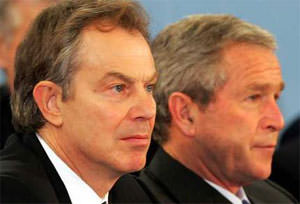As the U.S. Surges, Britain Withdraws
As the U.S. prepares to escalate the war, Britain's plan to withdraw up to 3,000 troops from southern Iraq has added tension to an already strained relationship.
As the U.S. prepares to escalate the war, Britain’s plan to withdraw up to 3,000 troops from southern Iraq has added tension to an already strained relationship.
British officials have made an effort to keep up a good front, but the war’s overwhelming unpopularity and a shifting political landscape suggest that the UK’s role as abused housewife in the coalition of the willing may be coming to an end. Time to step it up, Denmark!
Your support matters…Guardian:
Signs of tension between the US and Britain over London’s plans to withdraw some of the 7,000 UK troops in southern Iraq from this spring emerged yesterday. Speaking on the day that the foreign secretary, Margaret Beckett, said she remained confident that British troops would start to be withdrawn from Basra in the spring, the US ambassador in Baghdad, Zalmay Khalilzad, said he wanted Britain to keep its troops at its current level.
Mr Khalilzad said: “We would like to coordinate and for us to have a joint plan, and we are talking about this. It is clear our preference would be ‘the longer we stay together here the better’.” He said talks between Washington and London over the issue were continuing and he had no doubt that a “mutually acceptable” agreement could be reached.
London has been eager to play down any conflict between the US decision to mount a 20,000-troop surge in Baghdad, including an attempt to wrest back control of the Shia-dominated Sadr City, and the British decision to start withdrawing from the Shia south. Britain is planning to announce phased troop withdrawals from the streets of Basra, with as many as 3,000 troops sent home, or retained at Basra airbase and on the border with Iran.
Independent journalism is under threat and overshadowed by heavily funded mainstream media.
You can help level the playing field. Become a member.
Your tax-deductible contribution keeps us digging beneath the headlines to give you thought-provoking, investigative reporting and analysis that unearths what's really happening- without compromise.
Give today to support our courageous, independent journalists.





You need to be a supporter to comment.
There are currently no responses to this article.
Be the first to respond.